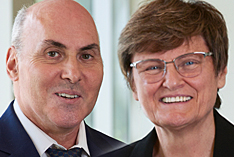Jessie Stevenson Kovalenko Medal

Scheduled for presentation in 2024, recipients will be announced in January 2024. To get awards news straight to your inbox, make sure to sign up for our Connect with Awards newsletter.
About the Jessie Stevenson Kovalenko Medal
The Jessie Stevenson Kovalenko Medal is awarded every two years for outstanding research in the medical sciences. The medal carries with it a $25,000 award, and an additional $50,000 for research. The Kovalenko Fund, gifted by Michael S. Kovalenko in 1949 to the National Academy of Science in memory of his wife, Jessie Stevenson Kovalenko, was specifically designed to recognize the achievements made to the medical sciences and, over the past 70 years, has honored many outstanding contributors.
Most Recent Recipient
 |
Katalin Karikó and Drew Weissman, University of Pennsylvania, received the 2022 Jessie Stevenson Kovalenko Medal.
Karikó and Weissman have made revolutionary contributions to enable the effective use of mRNA delivery for vaccines and immunotherapies.
Their work developing nucleoside-modified mRNA and nucleoside-modified mRNA-lipid nanoparticle vaccine platforms contributed to the foundations for the first two approved COVID-19 vaccines. Read more about their work»
Award History
The first Jessie Stevenson Kovalenko Medal was awarded to Alfred N. Richards in 1952 for his outstanding contributions to medical science over a period of a half-century, both as an investigator and as a research executive and administrator. Richards received his first honor in 1897, when he became the first graduate student at Columbia to earn his PhD in physiological chemistry. Richards’ early research focused on the liver and chronic indole poisoning as a possible cause for cyclic vomiting in children although later, he notably sought to study the physiological and ecological effects of the atomic bomb. Richards served as Chairman of the Committee on Medical Research for President Roosevelt and, from 1947-1950, he served as the National Academy of Sciences’ own President, overseeing the establishment of the National Science Foundation. Previous recipients of the Jessie Stevenson Kovalenko Medal continue to achieve outstanding advancements in their fields. Three recipients have been honored with a National Medal of Science, nine recipients have received a Lasker Award, and six recipients have received a Nobel Prize in Medicine (Rous 1966; Whipple 1934; Karikó 2023; Weissman 2023), in Chemistry (Lefkowitz 2012), and in Physiology (Allison 2018).
Recipients:
Katalin Karikó and Drew Weissman (2022)
For their pioneering work in developing nucleoside-modified mRNA, the foundation for the first two approved COVID-19 vaccines.
Read more about their work»
Watch thier acceptance speech»
Bert Vogelstein (2020)
For his pioneering work in elucidating the fundamental principles of the molecular basis of human cancer and the application of this knowledge to improve the clinical management of patients.
Read more about Vogelstein's work»
Watch Vogelstein's acceptance speech»
James P. Allison (2018)
For the discovery that antibody blockade of the T cell molecule CTLA-4 unleashes the body’s immune response against malignant tumors and develops immune checkpoint blockade as a successful cancer therapy.
Read more about Allison's work»
Watch Allison's acceptance speech»
Huda Y. Zoghbi (2016)
For her pioneering contributions to the fields of neurodegenerative proteinopathies, autism spectrum disorders, epigenetics, and developmental biology by coupling clinical observation and gene discovery with focused, in-depth mechanistic study.
Read more about Zoghbi's work»
Watch Zoghbi's acceptance speech»
For his pioneering achievements in defining the molecular basis of blood disorders and the mechanisms governing the development of blood stem cells and individual blood lineages. His work has significantly advanced our understanding of human hematologic diseases and revealed new strategies to prevent and manage these disorders.
Watch Orkin's acceptance speech»
For the discovery of leptin and its role in the regulation of appetite, energy expenditure, and the molecular mechanisms underlying obesity.
For his seminal studies that defined the physical properties, purification, and growth regulation of multipotent hematopoietic stem cells.
For his studies of the Hageman trait, an experiment of nature that improved understanding of such bodily defenses as the formation and dissolution of blood clots, inflammation, and immunity.
For his pioneering and influential studies in basic immunology, immune complex disease, immune deficiency disorders, and lymphocytic membrane markers.
For his immeasurable contribution to the diagnosis and treatment of human disease during his career, which was devoted to the physiology and chemistry of respiration and the mechanical and chemical properties of the human lung.
For furthering the essential understanding of balance between hereditary and other biological factors, on the one hand, and psychosocial experimental ones, on the other, in the pathogenesis and manifestations of schizophrenia.
For his discovery and application of coumarin anticoagulants.
For his notable role in advancing our knowledge of lobar pneumonia and in establishing clinical investigation as a science.
For his contributions of many biological discoveries basic for advances in clinical and experimental medicine.
For his outstanding contributions to medical sciences as an investigator, teacher, and administrator over a period of half a century.
For his outstanding contributions to medical science and for a life of exemplary devotion to medical education and inquiry into the origins of disease.
For his outstanding contributions to medical science and for long and continued devotion to the study of his chosen field of pathology.
For his outstanding contributions to medical science over a period of a half-century, both as an investigator and as a research executive and administrator.

